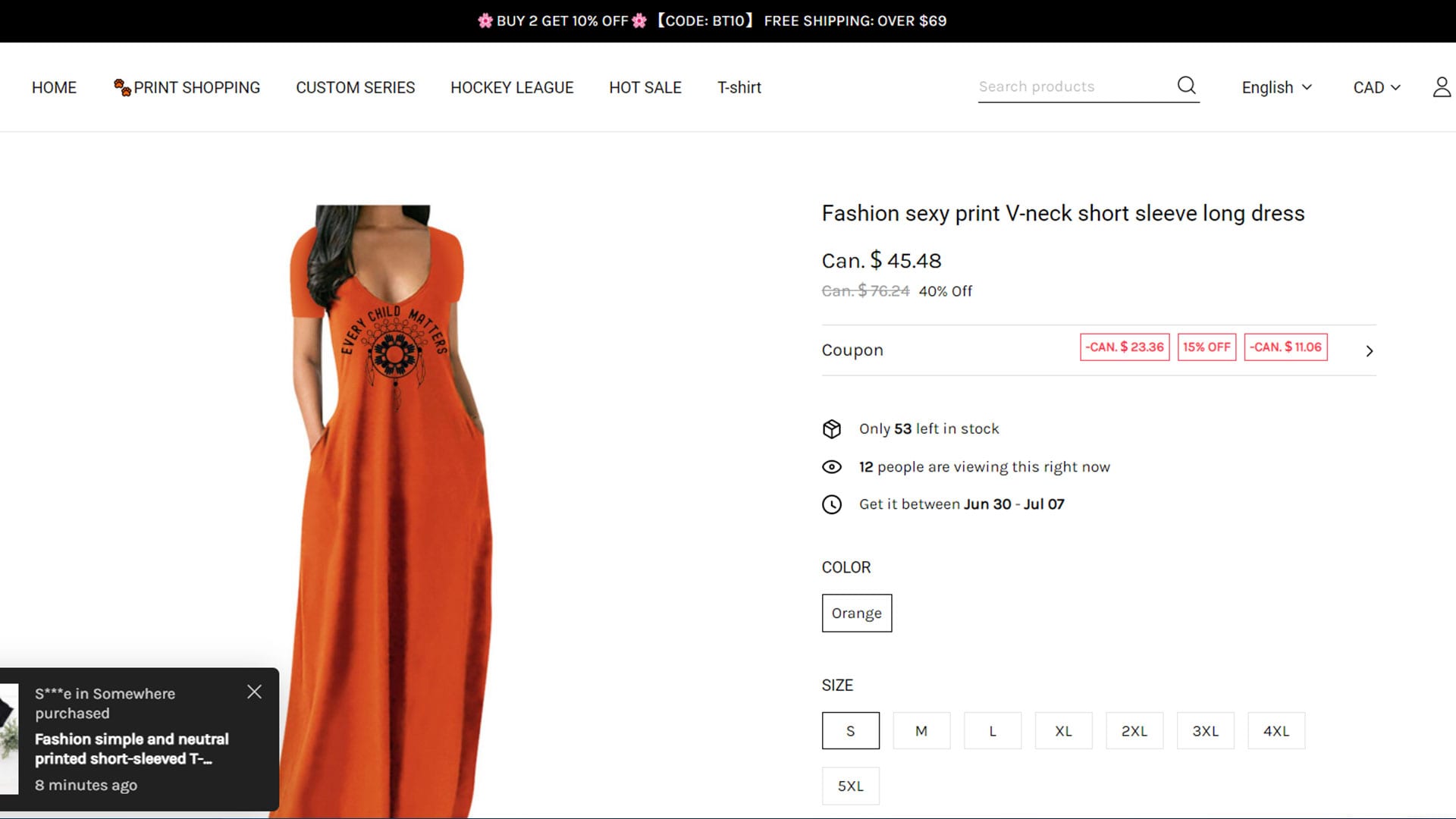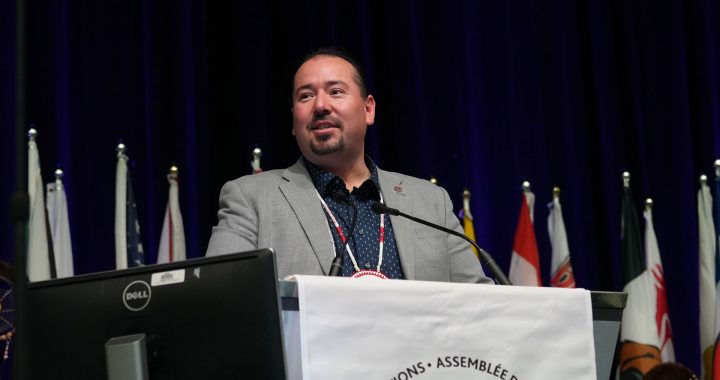A surge of clothing advertisements showcasing the Every Child Matters logo is upsetting many on Facebook.
Presumably sparked by the discovery of 215 children’s remains at the former Kamloops Indian Residential School in B.C. last month, a growing number of ads by online fashion companies are advertising clothing sporting the logo worn by models.
The ads appear to market the logo as fashion clothing with no mention of the meaning behind the phrase.
There does not appear to be any indication from the companies’ websites that profits from the sales of the clothing are donated to residential school survivors’ organizations.
“I have major problems with somebody profiting off of something like this,” says Andy Everson, a northwest coast artist from K’ómoks First Nation in B.C. who created a popular Every Child Matters logo which appears in many of the ads.
Everson says the logo is free to use for not-for-profit purposes like making T-shirts, patches and pins but he does not approve of companies using his design to cash in on the tragedy of residential schools.
“I think it really hurts. I don’t make any money off this personally. I did this with good intent and I expect that everybody that sells these shirts do it with good intent as well,” he says.

He notes the ads are glaringly insensitive of survivors’ experiences.
For instance, an ad for a dress on a clothing company called Keinee’s website is described as “a sexy print v neck.”
“To capitalize on such a devastating part of our history is unconscionable,” Everson says.
Maynard Johnny is a Coast Salish and Kwakwaka’wakw artist.
He’s angry the companies are profiting off of Indigenous artists’ work without asking for consent and has reported the ads to Facebook.
“These companies that do these types of things, I can’t believe they get away with it,” he says.
“The copyright laws in Canada I feel are too weak on people who steal, especially Indigenous art. It’s all over the world. I’m sure I have something of my work in Taiwan or India,” he says.
He thinks the companies should be held accountable for the ads.
“These companies ripping off artists and ripping off the initiative of the orange shirt should be fined and all profits should be given to some sort of Indigenous organization that will help heal,” he says.
Phyllis Webstad is Northern Secwepemc from the Stswecem’c Xgat’tem First Nation and is the founder and ambassador for Orange Shirt Day.
The movement was sparked in 2013 from her experience at residential school when her favorite orange shirt was taken away.
She says the ads are upsetting but nothing new as the Orange Shirt society has been dealing with companies stealing their Every Child Matters logo for years.
“It is people from other countries like the U.K., Morocco and Japan and even in the U.S., they’re stealing designs,” she says.
Webstad says she’s seen the logo appear on everything from clothing to bathmats and shower curtains.
“It’s a free-for-all without any real thought or reason behind the orange shirt and the story behind it. It’s just to make money.”
Buyer beware
Information regarding where the companies are based is scarce, though one company, Prideearthone, appears to be located in Texas.
APTN News reached out to several companies who posted ads on Facebook, but they did not respond by broadcast deadline.
Prideearthone responded afterward through Facebook message, stating “our company works towards the goals and raises awareness of ensuring that every child matters. Therefore, please rest assured that parts of the profits of selling the product will be donated for this fund.”
The company did not respond to follow up questions, such as what funds they were referring to or if they could explain the meaning behind Every Child Matters.
APTN also reached out to Digital Advertising Alliance of Canada (DAAC) which led to an investigation by Facebook Canada.
A spokesperson for Facebook Canada says the ads and the clothing companies’ Facebook pages have been removed for violating community standards on “inauthentic behaviour,” meaning they had engaged in conduct like falsely boosting their popularity by buying followers or using fake accounts.
“We want people to have a positive experience on Facebook, which is why we remove content that isn’t allowed on our platforms and give people tools to control what they see, including the ability to hide ads and advertisers,” the spokesperson said in an email statement.
Many of the original ads APTN found no longer appear on Facebook, though new, similar ads have popped up in recent days.
Webstad says trying to stop the ads is like playing whack-a-mole.
“When one shuts down they copy it and call it something else and away they go again.”
She says the society recently acquired a copyright and branding policy that will appear on its website in a few days. It will explain the society’s wishes and intentions regarding the marketing of its clothing.
She adds the society is also waiting for approval of a trademark for Every Child Matters.
“If we are successful receiving the trademark for Every Child Matters, we will then be able to draft and send out to these companies a cease and desist letter, but until then we really can’t do much, especially the ones in the other countries,” she says.
Meanwhile Everson and Johnny are advising people looking to buy Every Child Matters clothing to make sure profits go back to Indigenous organizations, such as the Orange Shirt Society, the Indian Residential School Survivors Society, Copper Legacy Indigenous Empowerment Society and Hope and Health.
“Be aware where you’re buying from and blatantly ask them if the profits are going to a non-profit society,” Everson says.
“It’s not enough to wear an orange shirt, you have to give back to those survivors and the work that’s being done for those survivors.”
The Indian Residential Schools Resolution Health Support Program has a hotline to help residential school survivors and their relatives suffering from trauma invoked by past abuse. The number is 1-866-925-4419.










